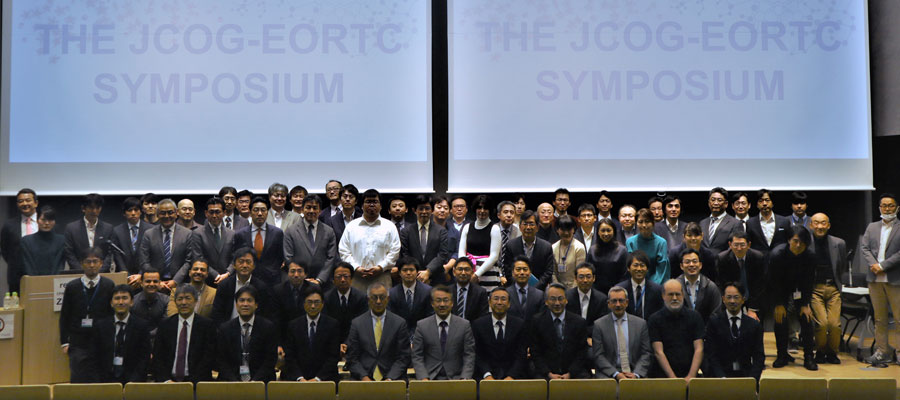The JCOG- EORTC symposium 15 February 2020
28 Apr 2020
In 2017, EORTC and JCOG, (Japan Clinical Oncology Group), established a partnership to conduct joint clinical trials. Both organizations have complementary expertise, with similar levels of operational activities. Despite differences in the delivery of treatments in Europe and Japan, both organisations agreed that common clinical questions that evaluate the efficacy of multidisciplinary strategies as compared to surgical treatment could be addressed through clinical trials.
During the JCOG-EORTC symposium held on 15 February 2020 in Japan, both organizations discussed the status of mutual collaboration and followed by a discussion on evolution of clinical research, which was split in three parts: Part 1: Genomic based clinical trials, Part 2: Clinical Trials not for drug approval and Part 3: Patient and Public Involvement.
Dr Yasuhiro Fujiwara, the Chief Executive Officer of PMDA, Pharmaceuticals and Medical Devices Agency, opened the session. He explained that the PMDA is a relatively young organization established in 2004. However, it has become recognized as one of the leading regulatory authorities together with its counterparts in Europe and the United States. From April 2019, PMDA started with its 4th Mid-Term Plan for the forthcoming 5 years, where it aims to proactively address novel approaches to product development utilizing the latest scientific technologies without delay, while ensuring its safety.
Both EORTC and JCOG presented updates on their activities, Dr Kenichi Nakamura informed the participants that JCOG headquarters was expanding its function to further support academic registration-directed trials and the increasing registration trials. JCOG has also been streamlining the study process, reducing the review process and introducing a progress management system for protocol development and the median duration from the concept approval has been reduced.
In terms of the collaboration with EORTC, the DREAM study is still ongoing and several collaborative projects have been proposed; however, many difficulties still exist to launch an interventional study such as different standard treatment, different drug availability, different regulatory system and funding. Up to now, 4 Japanese young investigators have worked as clinical fellows at EORTC headquarter.
Dr Masanori Terashima presented the collaboration with EORTC in JCOG stomach cancer study group (SCSG), Dr Hiroji Iwata presented collaboration with EORTC Breast Cancer Group, Dr Toshifumi Ozaki presented the collaboration between JCOG Bone and Soft Tissue Tumour Study Group and EORTC Soft Tissue and Bone Sarcoma Groups.
Dr Yasushi Goto presented the future perspective from JCOG genome-based treatment research committee. Japan launched a national project of genomic based medicine in cancer field by approving and fully reimbursing the comprehensive genomic panel sequencing in advanced cancer patients. In March 2019, JCOG Genome-based Treatment Research Committee was launched to consider the need and structure of cross-organ-based studies.
For the second part of the symposium on “Clinical trials not for drug approval”, Dr Jan Bogaerts made a presentation on new clinical research trial designs. Oncology clinical trials have been employing novel approaches such as basket trials, umbrella trials and ones that are more complex receive relatively high attention. The talk gave examples for each novel category and discussed the relative merits and challenges with such approaches.
Dr Ken Kato presented the importance of non-drug (surgery/radiotherapy) clinical trials in JCOG. Among 113 Phase III randomized trials of JCOG, 21 trials were conducted as non-drug trials, which included comparisons of surgical procedures (16), radiation techniques (3), endoscopic treatments (1) and follow-up periods (1). For further investigation, multimodal clinical trials are important therefore, clinical trials of neoadjuvant chemotherapy with new drugs followed by surgery, or chemoradiotherapy with new drugs have been conducted.
Dr Denis Lacombe made a presentation on how to run a trial that is not for new drug approval in Europe. He addressed the importance of independent, academic trials, which are organised by non-commercial sponsors that operate under stringent financial constraints. In addition, trials conducted by independent research often bear a high scientific agenda with translational research objectives and are supported by quality assurance programs.
In the third part of the symposium on “Patient and Public Involvement”, Dr Haruhiko Fukuda presented JCOG’s activities in this area. Patient & Public Involvement (PPI) in JCOG started in 2015, under the leadership by the former JCOG President, Dr. Kensei Tobinai. In April 2018, JCOG PPI Committee was established, which is chaired by Dr. Junji Furuse, Group Chair of HBPOG, and vice-chaired by Dr. Dai Maruyama, Group Secretary of LSG. A number of workshops and seminars have been held by the committee to discuss PPI in JCOG.
Ms Anastassia Negrouk presented PPI from the perspective of EORTC. She presented how EORTC set up PPI from 2011 and the challenges and processes that were involved. She emphasised the importance of PPI for bringing quality and relevance to clinical research.
This symposium further established the partnership between JCOG and EORTC. Both partners look forward to further collaborations in the future.
Related News
Meet the new EORTC Board
9 Jul 2024
We are pleased to announce the release of the EORTC 2023 Annual Report
17 Jun 2024
Dr Denis Lacombe, EORTC CEO, appointed stakeholder co-chair of ACT EU advisory group
24 May 2024
Clinical Trials Day 2024: a Q&A on pragmatic clinical trials
20 May 2024
EORTC/EMA workshop suggests an international way forward for treatment optimisation studies
8 May 2024
EORTC’s Participation at the ESTRO Congress 2024
29 Apr 2024
EORTC: Advancing research and treatment for rare cancers
29 Feb 2024
EORTC Fellowship Programme: celebrating more than 20 years of impactful collaboration
22 Feb 2024
Appointment of Malte Peters as EORTC Strategic Alliance Officer
9 Feb 2024
Unique series of workshops in partnership with the European Medicines Agency (EMA)
7 Feb 2024


